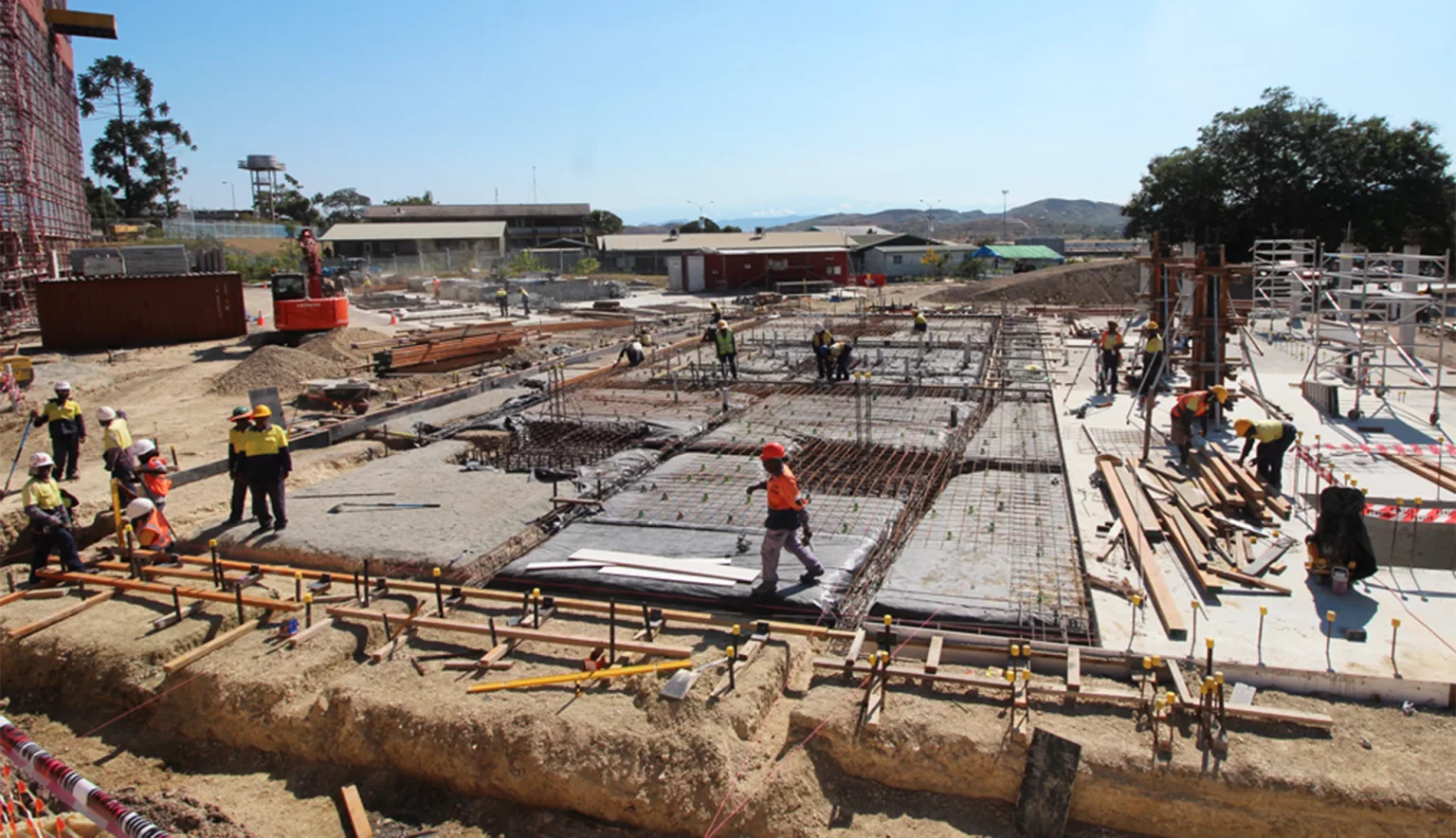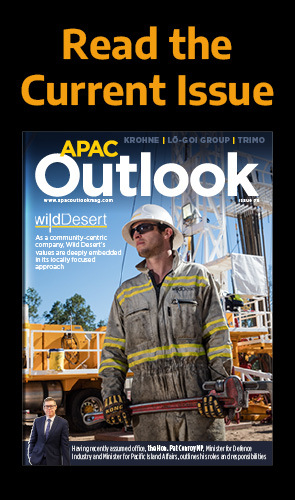The PICSA Group has been a concrete fixture in Papua New Guinea’s construction sector for over 50 years. Executive Director Partha Sarathy talks expansion, diversification, and supporting the local community.
BUILDING PAPUA NEW GUINEA
Construction in Papua New Guinea is on the rise.
Located in the eastern part of the world’s second largest island, Papua New Guinea (PNG) is a land rich with natural resources. This diverse landscape has an active geological history that provides plentiful raw materials, aiding the country’s dominant mineral exports.
PNG’s construction sector is intrinsically linked to the islands’ extractive industries, which accounted for approximately 28 percent of GDP in 2019 and as such represents a significant contribution to the country’s economy.
The construction sector itself enjoyed a peak in 2012, when construction activity accounted for 0.9 percent of real GDP growth – a boom that was heavily influenced by the country’s flagship liquefied natural gas (LNG) project.
The sector has historically faced significant challenges, including project delays resulting from a heavy reliance on imported materials and foreign exchange (forex) shortages.
Construction activity in PNG has also been hampered by the limited availability of land for development and insufficient human capital.
For Partha Sarathy, Executive Director at the PICSA Group, navigating challenges and overcoming hurdles are all part of the job.
“It’s the challenge that brings the best in people,” Sarathy comments, in reference to the difficult trading environment that the sector faces within the complicated context of PNG’s economy.
“PNG’s economy is highly resource dependent, which makes it more cyclical than other comparable nations. The last major resource projects here were in 2015, which can make the trading environment challenging,” he informs us.
Sarathy entered PNG’s construction sector after he was headhunted into the position of Executive Director at the PICSA Group, following his role as CFO of a large public utility also based in PNG.
“Senior management responsibilities are sector neutral and is more about strategy and getting the most out of people,” he comments.
PICSA’s PNG production facilities extend across the breadth of the island, with further expansion on the agenda.
“Geographically, we have operations in all the major centres in PNG, Port Moresby, Lae and Rabaul, with plans to open new locations,” Sarathy explains.
Their diverse network of locations is matched by the extensive portfolio of products and services that the Group offer, thereby distinguishing their reputation within the sector.
“PICSA Group has a unique position in the building products industry in PNG. We are highly diversified in terms of both geography and products.”
Across their extensive product range – which includes steel fabrication, concrete manufacture, roll-forming and pipe manufacture – quality is key. This is where supply chain management comes to the fore.
“The focus of the Group has always been on supplying quality products, but that can’t be achieved unless we source from reliable suppliers with whom we have long term links,” Sarathy comments.
Longevity is a key factor in establishing supplier relations and partnerships, as evidenced by the Group’s ongoing partnership with Bluescope Steel – an established provider of innovative steel products based in Australia.
“PICSA Group is the single largest customer of Bluescope Steel in PNG and our relationship with Bluescope extends over 50 years. We are also their only direct customer here,” he informs us.
PICSA’s supply chain is both local and international, and unsurprisingly, materials and machinery account for the Group’s main spend. Crucially, it is through these trusted partnerships that PICSA is able to guarantee quality.
“The steel and other products that we source are A/NZ standards compliant, so our customers can deal with us with confidence.”
The sector will continue to progress as PNG’s transport infrastructure develops – a key driver for continued construction activity – which runs parallel to the nationwide focus on increasing the supply of affordable housing.
Indeed, this is incorporated into PICSA’s goals as a specialist in construction, literally providing a roof over the heads of the island’s inhabitants through joint initiatives with the government.
“Across the country, we are supporting many members of Parliament, in supplying roofing and rainwater goods which improves the quality of life for their rural constituents,” he informs us.
The Group actively engage in projects that support local communities. Indeed, some 80 percent of PNG’s population live in rural areas with no access to modern amenities.
“Providing a quality roof to people who have none, is something we are proud of,” Sarathy comments.
PICSA have also contributed to this effort with their ‘L&A Housing Project’, which entails the provision of roofing, guttering, and flashings for eleven units of three-storey buildings, supplied by Barlow Industries – PICSA’s flagship production facility.
At a tangent to this are the upscale, sizeable construction projects that the Group facilitate across the urban areas of PNG.
For instance, PICSA supplied the steel and concrete for the construction of the 5* Hilton Hotel in Port Moresby, which hosted the APEC (Asia-Pacific Economic Cooperation) conference in 2018.
They have also supplied and installed stainless steel works at PNG Jackson’s International Airport.
Other significant projects that are currently in process include the expansion of food product distributors Goodman Fielder International’s premises
“We are working closely with Goodman Fielders in Lae for their K500 million expansion by supplying all the concrete requirements as well as structural steel for many of the buildings for the project,” Sarathy tells us.
“We are also working with Fletcher Morobe Construction for their new multi-storey head office building for Teachers Savings and Loan Society (TISA), which is the largest credit union in the Pacific,” he adds.
It is these major projects that have given the Group continued security amidst the economic disruption of the pandemic.
“Of particular comfort are the repeat orders we are getting for large projects from major construction businesses in PNG. That said, we are doing something right and that gives us a plat form to grow on,” Sarathy comments.
CARING FOR THE COMMUNITY
Although a multinational company, PICSA’s long-established presence on the island is a source of great pride.
“Our connections to PNG date back more than 50 years, pre independence, which makes us one of the oldest business houses here,” Sarathy explains.
The welfare of the indigenous inhabitants of PNG is a priority for PICSA, and the organisation continues to support the local community in a myriad of ways – none more so than by providing valued employment opportunities.
As Sarathy informs us, approximately 98 percent of PICSA’s 1,500 strong workforce originate from the island.
“Our support to the community takes many forms,” Sarathy comments.
“There is a significant focus in the Group to train and promote our national colleagues, which we think is part of our social licence obligation,” he adds.
Alongside employment opportunities, PICSA invest in the training and development of their staff and champion a sustainable means of recruitment.
“There is a strong focus on promoting staff from within, which rewards performance.”
“Training, particularly for national staff, is a key focus and they are encouraged and supported to undertake professional level qualifications. This policy has served us well during the pandemic as we have a local staff pool to turn to,” he continues.
“The Group operates a decentralised structure, which empowers people to bring the best out of them but also makes sure we can attune our products to local needs,” Sarathy elaborates.
Looking ahead, Sarathy has his sights set on PNG’s central Highlands as a targeted area for the Group’s expansion.
“We are looking at new locations for expansion of our operations. Additionally, we are expanding PVC pipe manufacture, with new extrusion plants being installed in POM and Lae. This is expected to be followed by new PE pipe manufacturing plant in POM.”
These opportunities for growth are an exciting prospect.
Although the construction segment has experienced unprecedented disruption caused by the pandemic, the PNG 2020 national budget forecasted that the construction sector’s contribution to nominal GDP would increase from PGK5.4 billion ($1.6 billion) in 2019 to PGK5.9 billion ($1.7 billion) in 2020. For 2021, this is estimated at approximately PGK6.4 billion ($1.9 billion).
Nevertheless, these figures reflect the general optimism that surrounds the sector – a sentiment that is channelled by Sarathy himself.
“Despite the macro economic challenges, we think 2021 will be a record year for us in terms of sales,” he concludes optimistically.





























